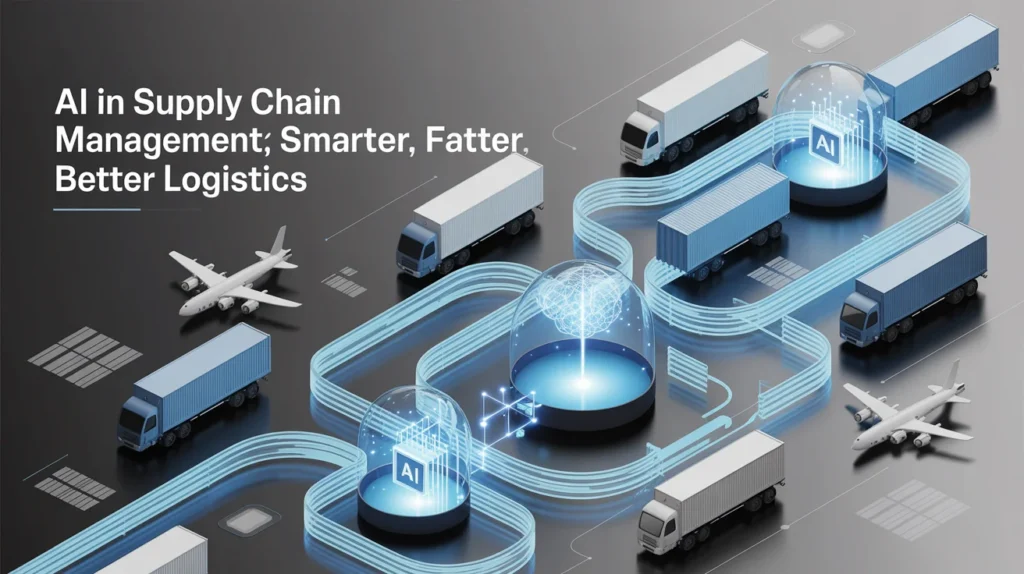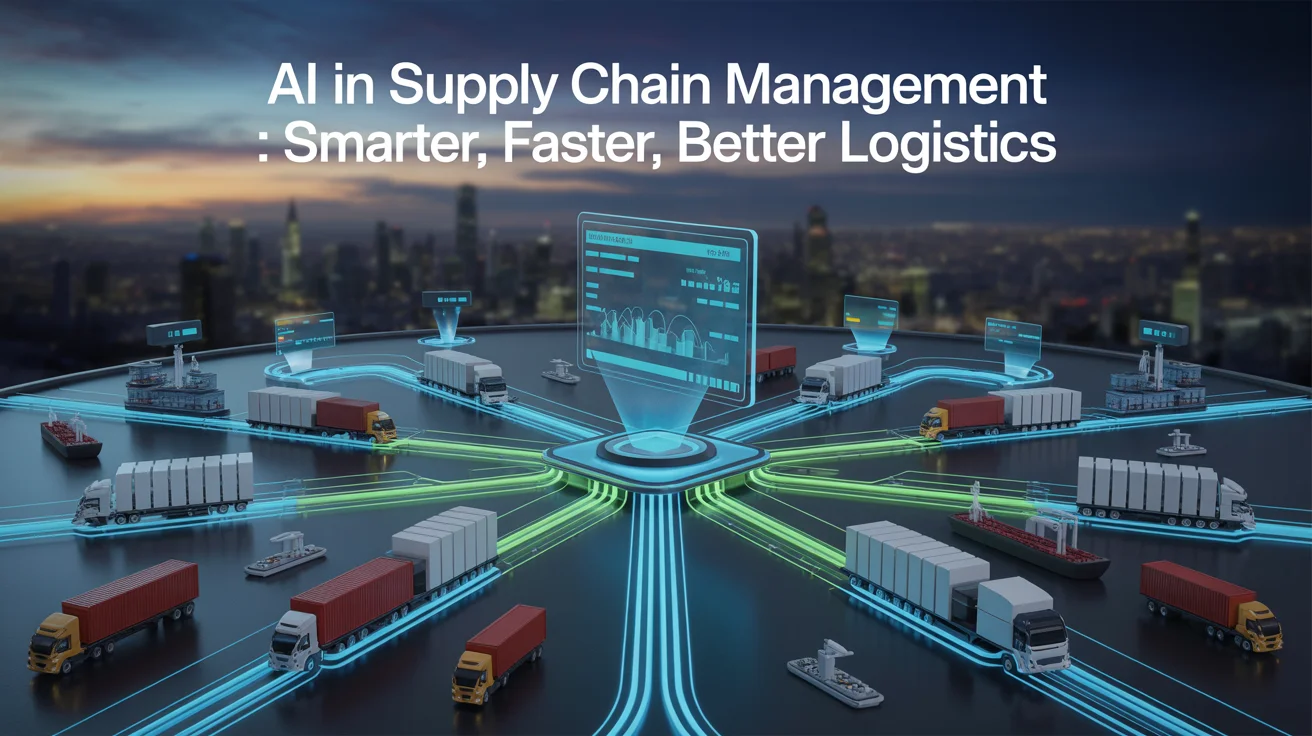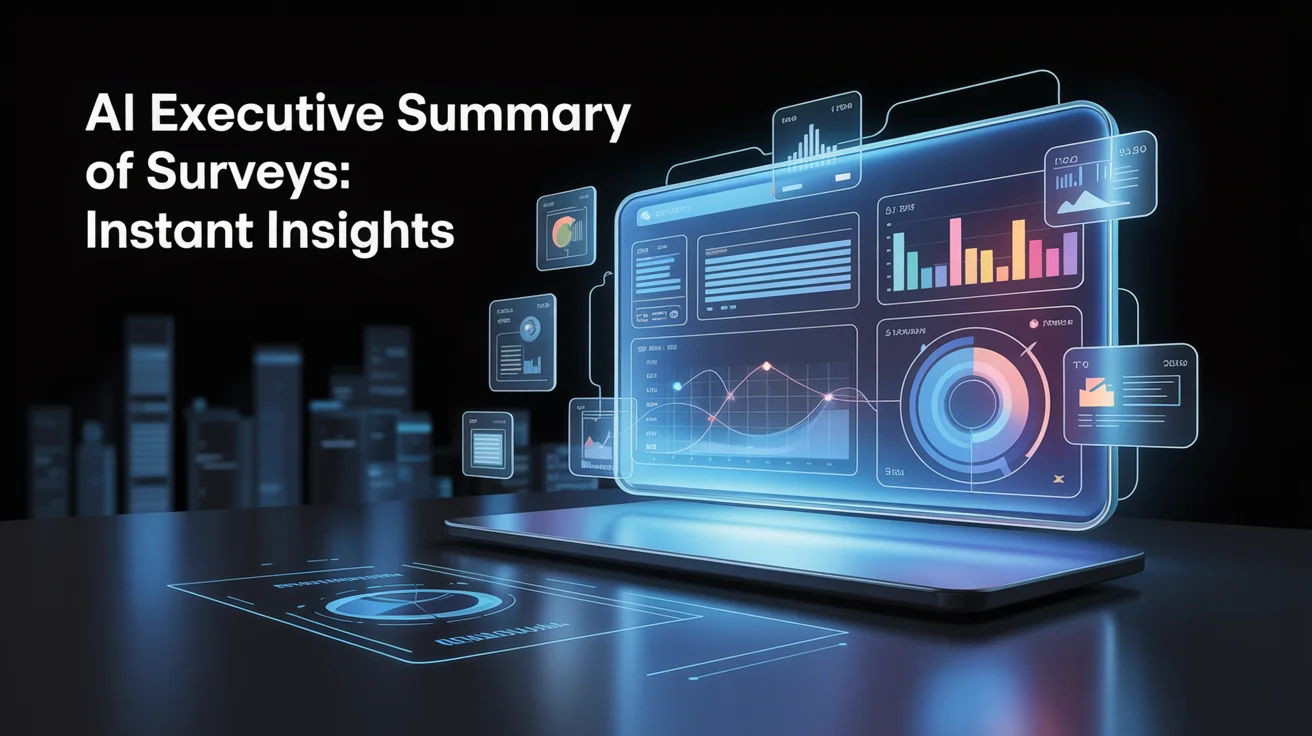In today’s fast-paced business world, AI in supply chain management is no longer a future trend; it’s the present reality. Companies worldwide are using artificial intelligence to improve operations, cut costs, and stay competitive.
From predicting demand to automating warehouses, AI is helping supply chains become smarter, faster, and more reliable. This article explores how AI transforms supply chain management, supported by practical use cases and strategies.
How AI Improves Demand Forecasting
AI helps companies predict what customers will buy and when. Traditional forecasting relied on historical sales data and manual analysis. But AI uses machine learning to analyze real-time data, seasonal trends, customer behaviour, and external factors like weather or economic shifts.
With AI, businesses can avoid overstocking or understocking. It helps plan better promotions, optimize production, and reduce waste, making companies more responsive to changing market demands.
AI-Powered Inventory Management
Keeping the right amount of inventory is a constant challenge. Too much inventory ties up cash, and too little means missed sales. AI solves this by analyzing sales, supplier, and market trends data.
It gives real-time suggestions on what to restock and when. AI can even predict potential supply disruptions and recommend alternatives. This leads to better stock control, reduced carrying costs, and higher customer satisfaction.
Warehouse Automation with AI
AI has transformed warehouses from simple storage areas into smart, automated hubs. AI-driven robots can pick, sort, and move items faster than humans, improving accuracy and cutting labor costs.
Smart cameras and sensors powered by AI can track inventory in real time. They also help detect damaged goods or misplaced items. These systems improve speed, safety, and efficiency in warehouse operations.
Benefits of AI in warehouse management:
- Faster order fulfilment and fewer delays
- Reduced human error in picking and packing
- Lower operational costs through automation
- Real-time visibility into warehouse operations
- Improved worker safety with AI-powered monitoring
Enhancing Logistics and Transportation

AI plays a critical role in logistics. It helps plan the best delivery routes based on traffic, fuel costs, and weather. AI can also adjust routes in real-time to avoid delays, saving time and money.
With AI, logistics teams can better manage fleets, track shipments, and predict delivery times more accurately. This increases customer satisfaction and lowers delivery failures.
Key applications in logistics and transport:
- Route optimization and dynamic rerouting
- Predictive maintenance for vehicles
- Real-time GPS tracking of shipments
- Reduced fuel consumption
- Improved delivery estimates and customer updates
Supplier Risk Management Using AI
Suppliers are crucial but can also be a significant risk if they fail to deliver. AI helps companies evaluate and monitor suppliers in real time. It scans data from multiple sources to spot risks like financial trouble, poor performance, or political unrest.
AI can alert managers before problems happen. It also helps identify new suppliers quickly if needed. This protects the supply chain from disruption and builds stronger, more reliable partnerships.
Boosting Sustainability in Supply Chains
Sustainability is now a key priority for businesses. AI can help track environmental impact across the supply chain. It identifies areas where emissions, waste, or energy use can be reduced.
By analyzing production and transportation data, AI offers eco-friendly and cost-effective solutions. Companies can meet regulatory standards and build trust with consumers who care about green practices.
Real-Time Decision Making with AI
AI allows supply chain leaders to make fast, data-driven decisions. With real-time dashboards and predictive analytics, managers can respond instantly to changes in demand, delays, or disruptions.
For example, AI suggests alternative routes or vendors if a supplier fails to ship on time. If sales spike suddenly, it recommends production adjustments. This makes the entire supply chain more agile and resilient.
AI-powered platforms integrate with ERP systems, IoT devices, and customer data to offer complete visibility. This 360-degree view helps companies operate with confidence and precision.
Core advantages of real-time AI decisions:
- Instant alerts and proactive responses
- Improved communication across departments
- Better customer service through timely updates
- Reduced downtime during crises
- Stronger coordination between supply and demand
Personalized Customer Experiences
AI doesn’t just help behind the scenes; it improves the customer experience too. AI systems analyze customer preferences and buying habits. This data is used to create personalized offers, recommend products, and improve service.
When customers order a product, AI predicts delivery times, shares real-time tracking, and sends updates. It also automates responses to common questions, reducing pressure on support teams.
These personalized touches build loyalty and boost repeat sales. Customers get what they want, when they want it, without friction.
How AI enhances customer experience:
- Tailored product recommendations
- Faster customer support with AI chatbots
- More accurate delivery predictions
- Personalized promotions and emails
- Seamless post-purchase experiences
Cost Reduction Across the Supply Chain
AI helps companies lower costs without cutting quality. It finds inefficiencies, automates tasks, and optimizes resources. For instance, it identifies slow-moving items to be discounted or replaced.
AI also reduces labor costs through automation and minimizes losses due to errors or delays. Over time, these small savings add up to significant results.
Three main ways AI cuts costs:
- Automating manual tasks like data entry or reporting
- Optimizing supply and demand to prevent overproduction
- Predicting disruptions and avoiding costly delays
Conclusion:
AI in supply chain management is no longer a luxury; it’s necessary for companies that want to stay agile, efficient, and competitive.
From more intelligent forecasting to real-time decision-making, AI delivers value at every stage of the supply chain. It helps businesses cut costs, reduce risks, and more precisely meet customer expectations.
As global markets grow more complex and customer demands shift rapidly, companies must embrace intelligent systems to stay ahead.
AI doesn’t just streamline operations; it creates new opportunities for innovation and growth. The future of supply chain management is digital, data-driven, and powered by AI.
Frequently Asked Questions:
What is AI in supply chain management?
It refers to using artificial intelligence to automate, optimize, and improve supply chain processes like forecasting, logistics, and inventory.
How does AI reduce costs in supply chains?
AI cuts costs by improving efficiency, reducing waste, automating manual work, and helping companies avoid risks and disruptions.
Can small businesses use AI in their supply chains?
Yes. Many AI tools are now affordable and easy to use, making them accessible to businesses of all sizes.
Is AI replacing human workers in supply chain roles?
AI is not replacing all workers. Instead, it supports them by automating repetitive tasks and helping them make better decisions.
What industries benefit the most from AI in supply chain management?
Retail, manufacturing, healthcare, and logistics companies are among the biggest beneficiaries.




